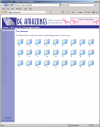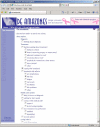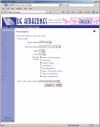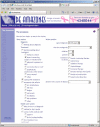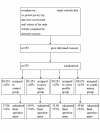How breast cancer patients want to search for and retrieve information from stories of other patients on the internet: an online randomized controlled experiment
- PMID: 20215101
- PMCID: PMC2855205
- DOI: 10.2196/jmir.1215
How breast cancer patients want to search for and retrieve information from stories of other patients on the internet: an online randomized controlled experiment
Abstract
Background: Other patients' stories on the Internet can give patients information, support, reassurance, and practical advice.
Objectives: We examined which search facility for online stories resulted in patients' satisfaction and search success.
Methods: This study was a randomized controlled experiment with a 2x2 factorial design conducted online. We facilitated access to 170 stories of breast cancer patients in four ways based on two factors: (1) no versus yes search by story topic, and (2) no versus yes search by writer profile. Dutch speaking women with breast cancer were recruited. Women who gave informed consent were randomly assigned to one of four groups. After searching for stories, women were offered a questionnaire relating to satisfaction with the search facility, the stories retrieved, and impact of the stories on coping with breast cancer. Of 353 enrolled women, 182 (51.6%) completed the questionnaire: control group (n = 37), story topics group (n = 49), writer profile group (n = 51), and combination group (n = 45).
Results: Questionnaire completers were evenly distributed over the four groups (chi(2) (3) = 3.7, P = .30). Women who had access to the story topics search facility (yes vs no): were more positive about (mean scores 4.0 vs 3.6, P = .001) and more satisfied with the search facility (mean scores 7.3 vs 6.3, P < .001); were more positive about the number of search options (mean scores 2.3 vs 2.1, P = .04); were better enabled to find desired information (mean scores 3.3 vs 2.8, P = .001); were more likely to recommend the search facility to others or intend to use it themselves (mean scores 4.1 vs 3.5, P < .001); were more positive about how retrieved stories were displayed (mean scores 3.6 vs 3.2, P = .001); retrieved stories that better covered their information needs (mean scores 3.0 vs 2.6, P = .02); were more satisfied with the stories retrieved (mean scores 7.1 vs 6.4, P = .002); and were more likely to report an impact of the stories on coping with breast cancer (mean scores 3.2 vs 2.9, P =. 02). Three main effects were associated with use of the writer profile search (yes vs no): being more positive about (mean scores 3.9 vs 3.6, P = .005) and more satisfied with the search facility (mean scores 7.1 vs 6.5, P =. 01), and being more positive about how retrieved stories were displayed (mean scores 3.8 vs 2.9, P < .001). For satisfaction with the search facility, an interaction effect was found (P = .03): at least one of the two search facilities was needed for satisfaction.
Conclusions: Having access to the story topics search facility clearly had the most positive effect on patient satisfaction and search success.
Conflict of interest statement
None declared
Figures
Similar articles
-
Illness stories on the internet: what do breast cancer patients want at the end of treatment?Psychooncology. 2007 Oct;16(10):937-44. doi: 10.1002/pon.1157. Psychooncology. 2007. PMID: 17274107
-
A descriptive study of the use of the Internet by women seeking pregnancy-related information.Midwifery. 2009 Feb;25(1):14-20. doi: 10.1016/j.midw.2007.01.010. Epub 2007 Apr 3. Midwifery. 2009. PMID: 17408822
-
Illness stories on the Internet: features of websites disclosing breast cancer patients' illness stories in the Dutch language.Patient Educ Couns. 2006 Jun;61(3):435-42. doi: 10.1016/j.pec.2005.05.010. Epub 2005 Jul 1. Patient Educ Couns. 2006. PMID: 15994056
-
Where one size does not fit all: understanding the needs of potential users of a portal to breast cancer knowledge online.J Health Commun. 2005 Sep;10(6):567-80. doi: 10.1080/10810730500228961. J Health Commun. 2005. PMID: 16203634 Review.
-
Online support of patients and survivors of cancer.Semin Oncol Nurs. 2011 Aug;27(3):229-36. doi: 10.1016/j.soncn.2011.04.008. Semin Oncol Nurs. 2011. PMID: 21783014 Review.
Cited by
-
Mapping publication trends and identifying hot spots of research on Internet health information seeking behavior: a quantitative and co-word biclustering analysis.J Med Internet Res. 2015 Mar 25;17(3):e81. doi: 10.2196/jmir.3326. J Med Internet Res. 2015. PMID: 25830358 Free PMC article.
-
Marking 15 years of the Genetic and Rare Diseases Information Center.Transl Sci Rare Dis. 2017 May 25;2(1-2):77-88. doi: 10.3233/TRD-170011. Transl Sci Rare Dis. 2017. PMID: 29152459 Free PMC article.
-
Internet-based randomized controlled trials: a systematic review.J Am Med Inform Assoc. 2013 May 1;20(3):568-76. doi: 10.1136/amiajnl-2012-001175. Epub 2012 Oct 13. J Am Med Inform Assoc. 2013. PMID: 23065196 Free PMC article.
-
E-nephrology.Indian J Nephrol. 2011 Jan;21(1):1-9. doi: 10.4103/0971-4065.78295. Indian J Nephrol. 2011. PMID: 21655161 Free PMC article.
-
Characterizing Social Networks and Communication Channels in a Web-Based Peer Support Intervention.Cyberpsychol Behav Soc Netw. 2016 Jun;19(6):388-96. doi: 10.1089/cyber.2015.0359. Cyberpsychol Behav Soc Netw. 2016. PMID: 27327066 Free PMC article.
References
-
- Ziebland Sue, Chapple Alison, Dumelow Carol, Evans Julie, Prinjha Suman, Rozmovits Linda. How the internet affects patients' experience of cancer: a qualitative study. BMJ. 2004 Mar 6;328(7439):564. doi: 10.1136/bmj.328.7439.564. http://bmj.com/cgi/pmidlookup?view=long&pmid=15001506328/7439/564 - DOI - PMC - PubMed
-
- McTavish F M, Gustafson D H, Owens B H, Hawkins R P, Pingree S, Wise M, Taylor J O, Apantaku F M. CHESS (Comprehensive Health Enhancement Support System): an interactive computer system for women with breast cancer piloted with an underserved population. J Ambul Care Manage. 1995 Jul;18(3):35–41. - PubMed
Publication types
MeSH terms
LinkOut - more resources
Full Text Sources
Medical

